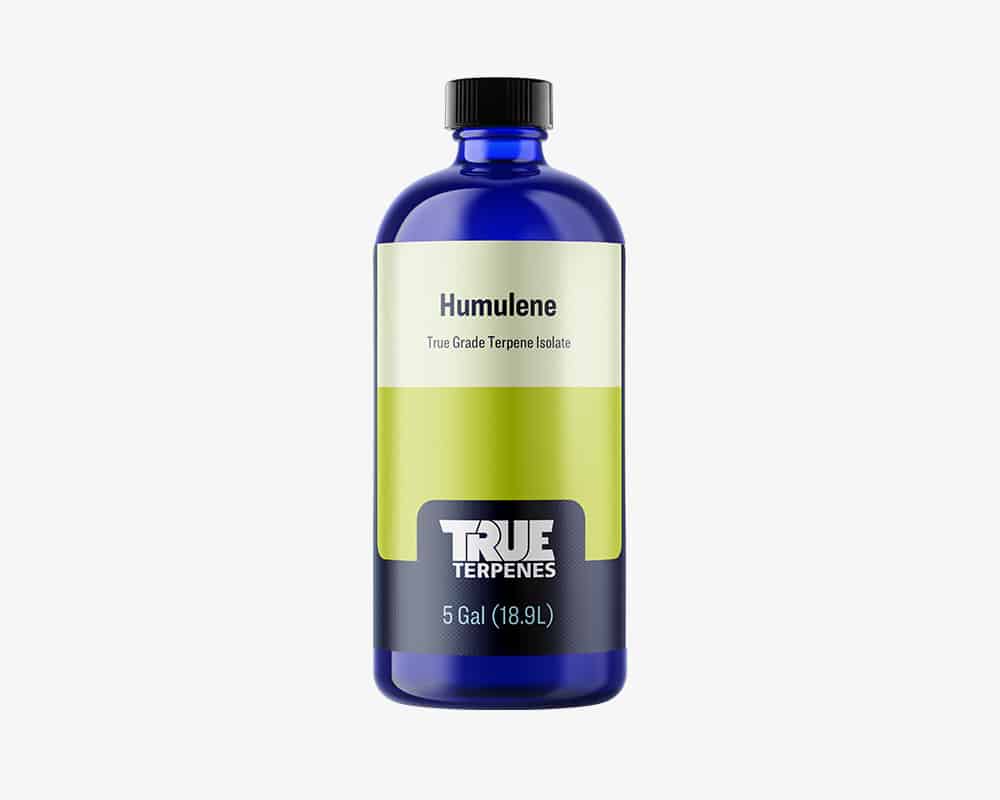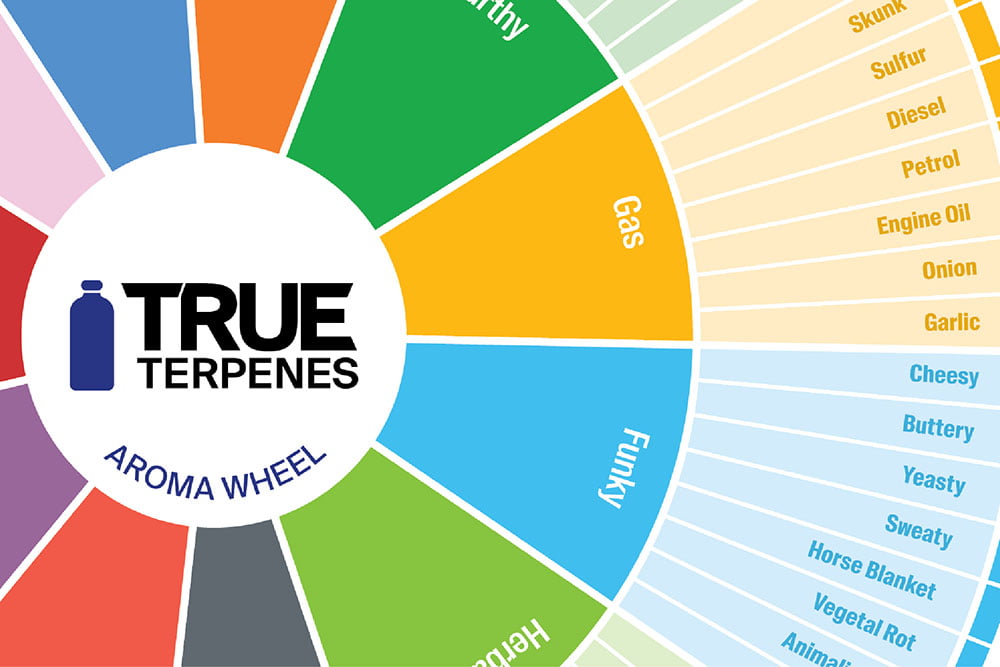June 21, 2023
Humulene Terpenes

Everything You Need to Know
Terpenes are naturally occurring compounds found in a wide variety of plants. When you bite into a sweet, juicy peach or smell the calming scent of dried lavender, you are experiencing the terpenes in these plants. Humulene is just one of the many common aromatic compounds found in cannabis and other plants. Learn about humulene terpene effects and benefits in this guide from the team at True Terpenes.
What Is Humulene?
Humulene is a terpene with a hoppy smell and taste. Its name comes from Humulus lupulus, the scientific name for the common hop plant. A monocyclic sesquiterpene, you may also see humulene listed as alpha-caryophyllene or alpha-humulene.
What Are The Effects of Humulene?
While terpenes are found in the cannabis plant, they do not have a psychoactive effect like cannabinoids. Inhaling or ingesting a terpene can’t get you high. However, terpenes do interact with the body’s endocannabinoid system (ECS), a cell-signaling network that is connected to the central nervous system.
The human body naturally produces endocannabinoids, molecules that help maintain homeostasis by regulating the release of other neurotransmitters. The ECS interacts with all the major organs in the body. Endocannabinoids bind to two types of receptors:
- Cannabinoid 1 (CB1) Receptors, which are mostly located in the brain
- Cannabinoid 2 (CB2) Receptors, which are located mainly on immune system cells
The ECS affects all kinds of processes, from sleep and thermoregulation to memory and mood.
What Is the Entourage Effect?
While more research is needed on the interaction of cannabinoids and cannabis terpenes, the entourage effect hypothesizes that these compounds have more powerful effects when they work in synergy. Thus, humulene effects may play a role in the benefits of cannabinoids like tetrahydrocannabinol (THC) and cannabidiol (CBD). It is possible that certain terpenes alter the way cannabinoids bind to CB2 receptors, or produce a complementary effect.
Additionally, every cannabis cultivar has its unique mix of compounds including terpenes, flavonoids, and cannabinoids. In addition to THC and CBD, other cannabinoids present in cannabis are:
- Cannabigerol (CBG)
- Cannabinol (CBN)
- Tetrahydrocannabivarin (THCV)
That means that different strains can offer different effects and benefits.
What Are the Benefits of Humulene?
Humulene has been used for many years in Traditional Chinese Medicine (TCM). For example, humulene-rich ginseng is used in TCM as a natural energy booster. Initial studies show promising opportunities for therapeutic uses. Humulene terpene benefits may include:
- Anti-inflammatory effects: Humulene has been shown to reduce pain and inflammation, so it could potentially be useful in treating chronic conditions.
- Antibacterial properties: Humulene may stop the spread of bacteria, which could have health benefits.
- Weight management: Because humulene is an appetite suppressant, it may be helpful for people who want to lose weight.
What Makes Humulene a Unique Terpene?
Some of the terpenes commonly found in cannabis, such as myrcene, pinene, linalool, and limonene, are monoterpenes – meaning they have 10 carbon atoms derived from two isoprene units.
In contrast, humulene is categorized as a sesquiterpene. These terpenes have three isoprene units, so they are not as volatile as monoterpenes and are more likely to retain their structure when a plant is dried or processed. Humulene frequently appears in different cannabis products, although it is not usually the most prominent terpene.
What Does Humulene Smell Like?
The aroma of humulene is often described as spicy, woodsy, herbal, or earthy. Humulene is a key aromatic compound in hops, a plant that is noted for its funky, bitter smell. Usually, humulene is not a dominant fragrance in cannabis strains. It is more prominent in spicy plants like ginger and ginseng.
What Does Humulene Taste Like?
The flavor notes of humulene are described as crisp, hoppy, or spicy. This terpene is present in herbs and spices including:
- Basil
- Black pepper
- Clove
- Coriander
- Ginger
- Ginseng
- Hops
- Sage
- Spearmint
If you drink a hoppy beer like an IPA, you will notice the distinct flavor of humulene.
What Strains Contain Humulene?
Humulene, myrcene, and caryophyllene are some of the most common terpenes found in cannabis strains. Enthusiasts will find humulene in a variety of cannabis strains, including:
- Candyland: A sativa strain, Candyland is known as a mood enhancer and has a sweet and spicy aroma.
- Death Star: An indica-dominant strain, Death Star’s strong aroma comes from a combination of humulene, caryophyllene, pinene, and limonene.
- Girl Scout Cookies: Also known as GSC, this is a popular hybrid strain that’s also indica-dominant.
- Headband: This is a cross between two well-known strains, OG Kush and Sour Diesel. Headband has a 40:60 ratio of sativa to indica.
- White Widow: This strain is known for its energizing effects, and gets its name from the numerous trichomes that give the bud a white appearance.
Is Humulene in a Sativa or Indica Strain?
Humulene is found in both indica and sativa strains. A dispensary will typically offer information about a particular strain’s terpene profile, as well as its THC and CBD content.
Humulene FAQs
Learn even more about this unique terpene:
Where does isolated humulene come from?
Isolated humulene can be naturally sourced from plants like sage, ginseng, spearmint, and hops, to name a few.
What is the difference between alpha-caryophyllene (α-caryophyllene) and beta-caryophyllene (β-caryophyllene)?
Alpha-caryophyllene (also known as humulene) and beta-caryophyllene are both types of sesquiterpenes. They have the same number of atoms: both have 15 carbon atoms and 24 hydrogen atoms. However, these two terpenes have different chemical arrangements, causing unique effects and sensory notes.
Beta-caryophyllene interacts with CB2 receptors in the body, which can decrease inflammation. You’ll find Beta-caryophyllene in most strains of cannabis, as well as in rosemary, cinnamon, and oregano.
How are terpenes like humulene extracted from plants?
The same terpene can be found in many different herbs, flowers, and fruits, but the chemical structure of the terpene is always the same, regardless of the plant from which it was isolated. Terpenes can be extracted from essential oils using processes like vacuum distillation or steam distillation. Note that terpene isolates are extremely potent and should not be used until they have been diluted. Safety data sheets are available for all of True Terpenes’ isolates and blends.
Learn More About Humulene Terpene Effects
Looking for a trusted supplier of humulene terpene isolate or other terpenes? At True Terpenes, we formulate and manufacture over 100 strains of terpene isolates, as well as custom blends. True Terpenes sells directly to customers and also offers bulk and wholesale options for businesses. Committed to advancing terpene education, we conduct in-house research on the entourage effect and the therapeutic potential of terpenes.Headquartered in Hillsboro, Oregon, True Terpenes has state-of-the-art facilities in compliance with Current Good Manufacturing Practices (cGMP). We’re also proud to be ISO-certified (ISO 9001:2015) and hold the Foundation Food Safety System Certification (FSSC) 22000. To find out more about True Terpenes and our products, contact us today.



